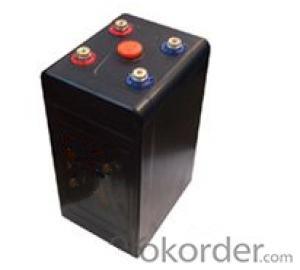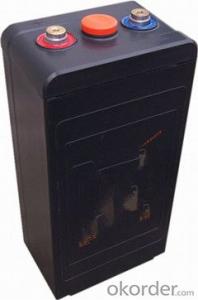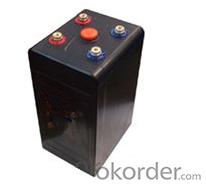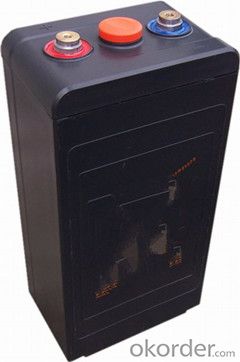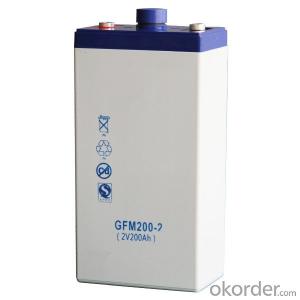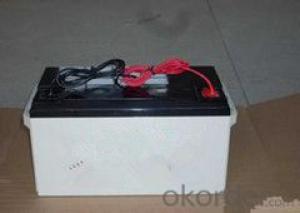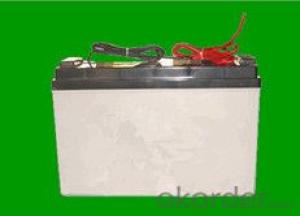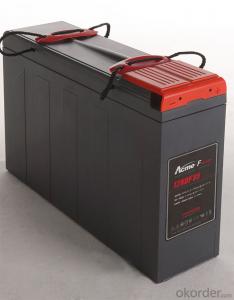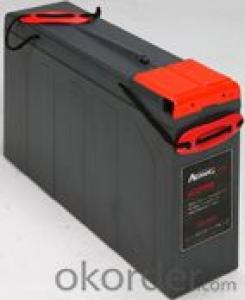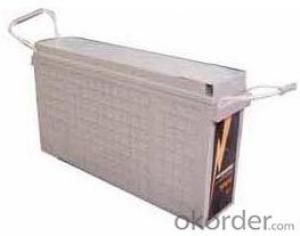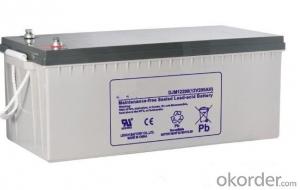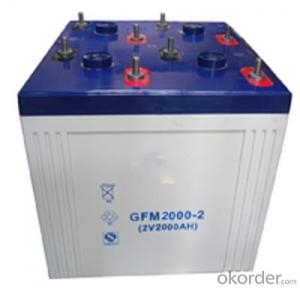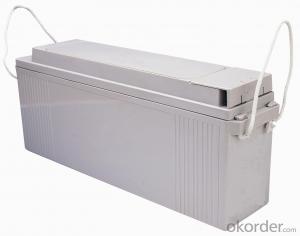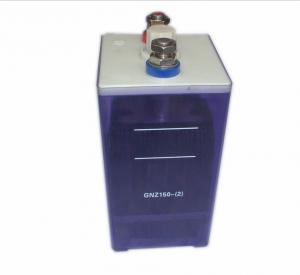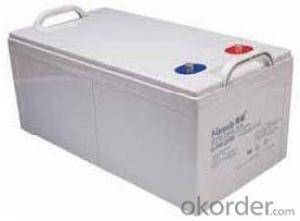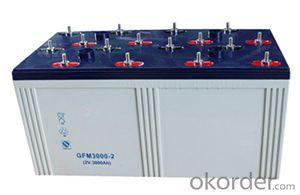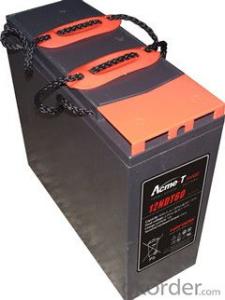battery the EosG series batteries EosG270
- Loading Port:
- Shanghai
- Payment Terms:
- TT OR LC
- Min Order Qty:
- 1000 unit
- Supply Capability:
- 2000000 unit/month
OKorder Service Pledge
OKorder Financial Service
You Might Also Like
Range summary
The EosG range of gel technology batteries offers outstanding performance including a 15+ years design life .
The EosG series batteries is designed based on the Eos series.
Using the polymer gel electrolyte .
Built to the highest standards and compliant with the latest IEC60896-21/22 standard .
This range also offers 100% capacity out-of-the-box and is capable of handling deep discharges for complete peace of mind. The use of flexible connectors and the ability to be installed both horizontally and vertically allows for multiple installation possibilities.
Technical features
Above 15 years designed life
Reliable post sealing structure
Excellent charging acceptant ability
Excellent performance at extreme high and low temperature
Low self-discharge ability
Flexible and convenient installation with slinky outside looking
Type: | EosG270 | |
Voltage: | 2V | |
Nominal Capacity: | 260Ah(C10) | 260Ah(10 hours rate:) |
Length: | 109mm | |
Width: | 184.5mm | |
Height: | 360.5mm | |
Height with termial: | 372mm | |
Weight: | 17.4Kg |
Compliant standards
IEC60896-21/22
BS6290 part 4
Telcordia SR4228
Eurobat guide
UL
Manufactured under system ISO9001(TUV)
EN 50272-2 or local equivalents
Correspondence exchange and transmission system
Mobile communication system
Power plant and power transformer system
Navigation and signaling system
Solar energy system
Radio and broadcasting station
Emergency lighting system
Plate special patent calcium and tin lead alloy and thick plate design
Container ABS(V0 optional)
Separator AGM
Valve EPDR
Electrolyte using the polymer gel electrolyte
Terminal M8 copper core posts
Battery installation compliant with:
Main applications
Products characteristics:
FAQ
![]() What is sulfation of batteries?
What is sulfation of batteries?
Sulfation is the formation or deposit of lead sulfate on the surface and in the pores of the active material of the batteries' lead plates. If the sulfation becomes excessive and forms large crystals on the plates, the battery will not operate efficiently and may not work at all. Common causes of battery sulfation are standing a long time in a discharged condition, operating at excessive temperatures, and prolonged under or over charging.
![]() How long a battery can last?
How long a battery can last?
The service design life of a battery are vary considerably with how it is used, how it is maintained and charged, temperature, and other factors.
![]() Do batteries self-discharge when not in use?
Do batteries self-discharge when not in use?
All batteries, regardless of their chemistry, self-discharge. The rate of self-discharge depends both on the type of battery and the storage temperature the batteries are exposed to. However, for a good estimate, Narada batteries self-discharge approximately 4% per week at 80ĄăF.
- Q: How to repair the battery?
- Charge the battery at constant voltage. It is the beginning of the time, using 0.1C ~ 0.25C current charge, to 16.2V later, by reducing the current method to maintain the charging voltage, until the charge current drops to 0.03C when the stop charging.
- Q: What is the difference between a maintenance-free battery and a conventional battery?
- Different materials will produce a different phenomenon: the traditional battery in the course of the use of the phenomenon of liquid reduction occurs, because the antimony on the grid will pollute the sponge on the negative plate of pure lead, weakened after the full charge of the battery Electromotive force, resulting in excessive decomposition of water, a large number of oxygen and hydrogen, respectively, from the positive and negative plates to escape, so that the electrolyte reduced. With calcium instead of antimony, you can change the fully charged battery back electromotive force, reduce the overcharge current, liquid gasification rate decreases, thereby reducing the loss of electrolyte.
- Q: How to deal with waste batteries?
- Laboratory recycling method: ordinary dry battery is cylindrical, the outer cylinder made of zinc, the zinc cylinder is the battery negative; tube central carbon rod for the positive; tube for the manganese dioxide, ammonium chloride and chlorination Zinc.
- Q: Maintenance-free battery how to detect it?
- Battery pole Pole terminal has corrosive material without treatment, as long as no loose on it. If the appearance of the corrosive material, the inner surface of the terminal will also be corrosion, resulting in increased resistance, affecting the normal battery charging and discharge, it must be promptly processed.
- Q: What battery does the van use?
- The battery is mainly composed of tube positive plate, negative plate, electrolyte, separator, battery compartment, battery cover, pole, injection liquid cover and so on. The electrode of the exhaust type battery is made of lead and lead oxide, and the electrolyte is an aqueous solution of sulfuric acid. The main advantage is the voltage stability, the price is cheap; the disadvantage is lower than the energy (that is, per kilogram of battery storage power), short life and routine maintenance frequently. Old ordinary battery life of about 2 years, and the need to regularly check the height of the electrolyte and add distilled water. However, with the development of science and technology, lead-acid battery life becomes longer and maintenance is also more simple.
- Q: What are the advantages of maintenance-free batteries?
- Maintenance-free battery because of its normal charging voltage, the electrolyte only produce a small amount of gas, so throughout the use of the need for the addition of distilled water, in the normal charging system, do not need to remove the charge from the removal. But in the maintenance of the proportion of its electrolyte should be checked.
- Q: What is the meaning of the battery above 12v65Ah?
- 12V is said to be the voltage, 65Ah is the current. (A is the unit of current. H is the time unit .1 hours.)
- Q: 80ah how much battery storage capacity?
- Is 80AH. Understood to discharge at 80 amps for about 1 hour (but not to say that after 1 hour is finished, there is still electricity). In theory, this is your battery power.
- Q: How does battery activation work?
- Always keep the battery surface clean. Found that the surface of dust and acid, it should be timely wipe, wipe can be wiped with soda water wipes wipe again, after rinse with water.
- Q: Lead-acid battery how to maintain?
- Open the rubber cap, exposing the exhaust raft, you can see the battery inside, some of the battery exhaust cutting can be unscrewed.
Send your message to us
battery the EosG series batteries EosG270
- Loading Port:
- Shanghai
- Payment Terms:
- TT OR LC
- Min Order Qty:
- 1000 unit
- Supply Capability:
- 2000000 unit/month
OKorder Service Pledge
OKorder Financial Service
Similar products
Hot products
Hot Searches
Related keywords
